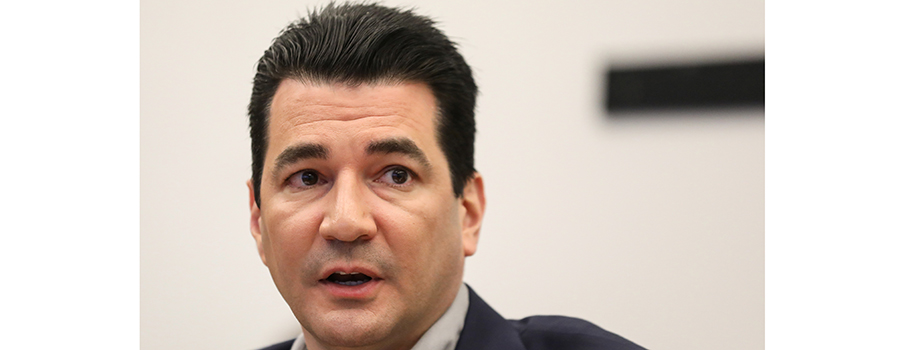Biologics manufacturing and diagnostics need resiliency, says Scott Gottlieb

Former FDA Commissioner lays out roadmap for building out excess capacity to deal with pandemic situations
The ongoing COVID-19 pandemic means resiliency is likely to be built into US biologics manufacturing and diagnostics testing going forward, with the government likely to incentivize the building of excess capacity, according to former US Food and Drug Administration Commissioner, Dr Scott Gottlieb.
In a keynote address entitled The Landscape of Affordable Healthcare sponsored by DuPont Nutrition & Biosciences, Gottlieb told the virtual CPHI Festival of Pharma event that to address a lack of biologics manufacturing capacity, the solution would be to ask manufacturers and contract manufacturing organisations currently operating a number of bioreactors at maximal capacity to increase their fleet, but not operate them at full capacity.
“That way, you always have some excess capacity within your system that you can move products out of the existing vats and free up vats for the production of a new drug if you had to bring it online quickly,” he said. “I think we’re going to see a lot more efforts by the government to pay for that resiliency and excess capacity.”
He said the COVID-19 pandemic had also highlighted a lack of capacity within diagnostics, with the country implementing a national stay at home order rather than targeting mitigation to get a handle on where the disease was spreading.
“One of the things we learned in the US, was that we didn’t have the ability to scale up diagnostic testing in the way that we thought we could,” he said. “Even if we had rolled out a diagnostic for coronavirus successfully, we didn’t have the capacity to run it at scale because the labs really didn’t have a lot of excess capacity.”
Gottlieb gave the example of Neupogen, a drug used to reconstitute bone marrow in the setting of chemotherapy, that would also become very important in the setting of radiological attack.
“We effectively paid the manufacturer to build in resilient, hardened manufacturing capacity that was distributed across the US to make sure there was never an uninterrupted supply of Neupogen,” he told the audience. “I think you’re likely to see the same thing in diagnostics screening capacity and biologics manufacturing capacity.”
Rounding off his address, Gottlieb had words of hope for countries in North America and Europe currently beleaguered by rising infection rates.
“We face a couple of hard months ahead of us at least [in the US and Europe], but we will get beyond COVID – this will eventually start to transition away from a pandemic phase and into a more seasonal pattern for this virus,” he said. “And hopefully as it does, we’ll have a vaccine available for mass inoculation of populations sometime in 2021, probably at the end of the second quarter but hopefully in time for the fall season.”
He predicted that healthcare systems would do a much better job of preserving life through the second wave, with infection fatality rates likely to come down significantly, although “probably not enough to change the consumer psychology round this virus. It’s going to take a couple more cycles and the introduction of a vaccine to have that kind of effect on psychology.”
He concluded by saying that health outcomes during the pandemic are likely to improve because doctors in the healthcare system feel far more prepared to deal with it.
“We’ve come a very long way in a very short period in terms of our ability to effectively grapple with this in our healthcare system. Set against all the death, disease and misfortune that this infection has caused, there have been some things to be hopeful for as well in terms of how we’ve improved outcomes, and how we will continue to do so with the addition of new therapeutics as we enter the fall and winter,” he said.

Related News
-
News US BIOSECURE Act passed by US House of Representatives
The controversial act, which has already impacted several foreign companies operating in the US, was passed by the House of Representatives on September 9, 2024. It is now headed for the US Senate before it can be signed into law by President Joe Biden... -
News Pharma Supply Chain People Moves
The latest appointments, promotions, and structural changes across the pharmaceutical supply chain. -
News Drug prices agreed upon as part of the US Inflation Reduction Act
The Inflation Reduction Act brought into constitution by the Biden administation in 2022, which proposed a drug price negotiation between the government and pharmaceutical companies, has reached it's first agreement. -
News BIOSECURE Act continues to loom over Chinese pharma manufacturers
With the US BIOSECURE Act on its way to passing into legislation, Chinese companies are facing declining revenues within the first half of 2024 as US pharmaceutical and healthcare companies pull their businesses from the country. -
News Ophthalmologic drug product Eylea faces biosimilar threats after FDA approvals
Regeneron Pharmaceutical’s blockbuster ophthalmology drug Eylea is facing biosimilar competition as the US FDA approves Biocon’s Yesafili and Samsung Bioepis/Biogen’s Opuviz. -
News ONO Pharmaceutical expands oncology portfolio with acquisition of Deciphera
ONO Pharmaceutical, out of Japan, is in the process of acquiring cancer-therapy maker Deciphera Pharmaceuticals for US$2.4 billion. -
News First offers for pharma from Medicare drug price negotiations
Ten high-cost drugs from various pharma manufacturers are in pricing negotiations in a first-ever for the US Medicare program. President Biden’s administration stated they have responded to the first round of offers. -
News Eli Lilly’s Zepbound makes leaps and bounds in weight-loss drug market
In the last week, Eli Lilly has announced their partnership with Amazon.com’s pharmacy unit to deliver prescriptions of Zepbound. Zepbound has also surpassed Novo Nordisk’s Wegovy for the number of prescriptions for the week of March 8.&nbs...
Position your company at the heart of the global Pharma industry with a CPHI Online membership
-
Your products and solutions visible to thousands of visitors within the largest Pharma marketplace
-
Generate high-quality, engaged leads for your business, all year round
-
Promote your business as the industry’s thought-leader by hosting your reports, brochures and videos within your profile
-
Your company’s profile boosted at all participating CPHI events
-
An easy-to-use platform with a detailed dashboard showing your leads and performance



.png)
.png)

.png)
.png)